

En Ethiopie, la « Charities and Societies Proclamation » ou la « loi anti-ONGs » - Grotius International. Au début de l’année, la Fondation Heinrich Boll avait du changer de locaux, devenus la cible des promoteurs qui font pulluler les hauts immeubles à Addis Abeba.
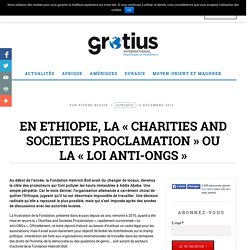
Une simple péripétie. Car le mois dernier, l’organisation allemande a carrément choisi de quitter l’Ethiopie, jugeant qu’il lui est désormais impossible de travailler. Une décision radicale qu’elle a repoussé le plus possible, mais qui s’est imposée après des années de discussions avec les autorités locales. La frustration de la Fondation, présente dans le pays depuis six ans, remonte à 2010, quand a été mise en œuvre la « Charities and Societies Proclamation », rapidement surnommée « loi anti-ONGs » . « A cette époque, nous avons pensé rester malgré tout, raconte Patrick Berg, le responsable local, qui venait alors tout juste d’arriver. Car Patrick Berg garde alors l’espoir de trouver une solution, en cherchant à se libérer de la tutelle de la « Charities and Societies Agency », une institution créée par la nouvelle loi.
Ministry of Foreign Affairs - MoFA. Background.
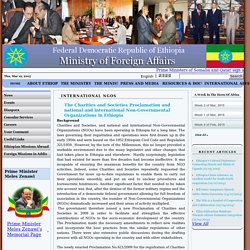
Ministry of Foreign Affairs - MoFA. Background Charities and Societies, and national and international Non-Governmental Organizations (NGOs) have been operating in Ethiopia for a long time.
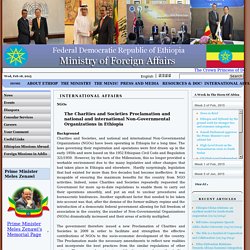
The laws governing their registration and operations were first drawn up in the early 1950s and were based on the 1952 Ethiopian Civil Code and Regulation 321/1959. However, by the turn of the Millennium, this no longer provided a workable environment due to the many legislative and other changes that had taken place in Ethiopia and elsewhere. Hardly surprisingly, legislation that had existed for more than five decades had become ineffective. Ethiopia - NGO Law Monitor - Research Center - ICNL.
Introduction | At a Glance | Key Indicators | International Rankings Legal Snapshot | Legal Analysis | Reports | News and Additional Resources Last updated 4 October 2014 Introduction Ethiopia has a long tradition of informal community-based organizations like the “idir” and “iqub” – self-help associations that operate at the local level and offer mutual socio-economic support to their members.
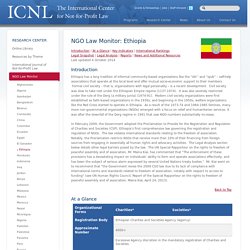
Formal civil society – that is, organizations with legal personality – is a recent development. Civil society was slow to take root under the Ethiopian Empire regime (1137-1974). Ethiopia’s Charities & Civil Societies Agency refuses to renew Ethiopian Economic Association (EEA) license. Posted by The Ethiopia Observatory Source: Addis Fortune The Ethiopian Charities & Civil Societies Agency (ECCA) has refused to renew the registration of the Ethiopian Economic Association (EEA), citing a contradiction of its structure with a law issued to regulate the works of charities and associations, in 2009.
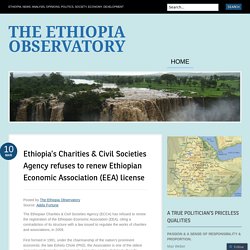
First formed in 1991, under the chairmanship of the nation’s prominent economist, the late Eshetu Chole (PhD), the Association is one of the oldest domestic platforms for professionals, led in the past by Befekadu Degefie (PhD), Brehanu Nega (PhD) and Wolday Amaha (PhD). It has a think-tank for economic policy making and host flagship international conferences annually.
Officials at the ECCA now say the EEA is acting in contravention of the Proclamation, generating more than 10pc of its revenues from foreign sources. They often cite the sharply declining number of civil society organisations, once over 4,000, down by half, since the passing of the law in 2008. Related Article: Charities and societies Agency. Basic requirements for the formation of a consortium of Charities and Societies Following the coming in to force of Charities and Societies Proclamation no. 621-2009, the executive organ has issued regulations and directives for the implementation of the law.
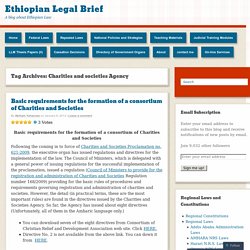
The Council of Ministers, which is delegated with a general power of issuing regulations for the successful implementation of the proclamation, issued a regulation (Council of Ministers to provide for the registration and administration of Charities and Societies Regulation number 168/2009) providing for the basic rules of procedures and requirements governing registration and administration of charities and societies. However, the detail (in practical terms, these are the most important rules) are found in the directives issued by the Charities and Societies Agency.
So far, the Agency has issued about eight directives (Unfortunately, all of them in the Amharic language only.) Who can establish a consortium? Ministry of Foreign Affairs - MoFA. African Union - NGO Law Monitor - Research Center - ICNL. Introduction | Key Facts | Members | At a Glance Key Legal Texts | Overview | Reports | News and Additional Resources Last updated 6 February 2015 Introduction The African Union (AU) came into existence in 2002 when it replaced the Organization of African Unity (OAU), which was established in 1963.
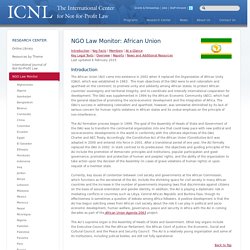
The main objectives of the OAU were to end colonialism and apartheid on the continent; to promote unity and solidarity among African states; to protect African countries' sovereignty and territorial integrity; and to coordinate and intensify international cooperation for development. Ethiopia - NGO Law Monitor - Research Center - ICNL.